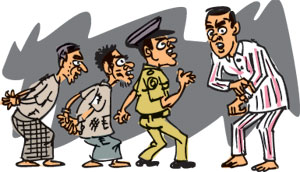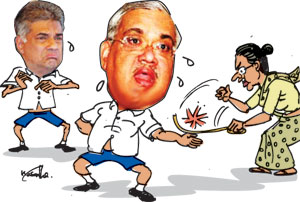Columns
UNPer hits back at SLFP wisecracker
View(s):Last Tuesday, President Mahinda Rajapaksa summoned a special meeting of the Sri Lanka Freedom Party (SLFP) Parliamentary group at the Presidential Secretariat. He was concerned about contradictory positions some Parliamentarians had taken on the 13th Amendment to the Constitution. Hence, he directed that the party should have one policy that should be followed by all. If there were those who had personal issues that ran counter, he said, they should leave.

With that over, Economic Development Minister Basil Rajapaksa boarded a Sri Lanka Air Force (SLAF) helicopter for a flight to Matale. There were several engagements for him. Accompanying him were some Matale District SLFP Parliamentarians, including Deputy Minister Rohana Dissanayake.
“Buddhimath theerana ganna aya vipaksheye nehe (There aren’t any in the opposition who could take a wise decision),” Rajapaksa told Dissanayake amidst the whir of the helicopter engines. “Eka aththa Sir, Samahara welawata harak andunaganna wenne ‘umbay’ kiyanakota thamai (That is true Sir, Cattle can sometimes be identified only when they shout umbay!),” Dissanayake declared.
“Prasiddiye guruwariyekwa dana gassaney buddhimath vedakda (Is ordering a teacher to kneel down a wise thing),” asked a UNP Parliamentarian who heard of the remarks. He was alluding to the incident where a UPFA Provincial Council member ordered a female teacher to kneel. This was after she had pulled up his daughter for coming to school in a short dress.
The key question that goes abegging
Outside office hours, the Police are known to produce suspects committing offences at the residence of Magistrates. This is common practice one would say. However, there was something uncommon last week. Colombo Fort Magistrate Thilina Gamage found officers from the Colombo Fort Police turning up at his Maharagama residence with six suspects. It was past 11 p.m.

Their offence: The suspects between the ages of 60 to 75 were begging on the streets. Magistrate Gamage asked the most logical question — Aren’t there any other major crimes occurring in theColombo Fort Police area?
He noted it was not the appropriate hour to send the six suspects to remand custody. He asked the Police to retain them at their station and provide them food. He said they could be produced in courts the next day. In courts the suspects pleaded guilty. The Magistrate warned and discharged them.
As one judicial officer remarked, if the Police were to arrest all the people who were begging on the streets to keep their body and soul together, the space available in the country’s jails would not be enough to keep them. They say that the Police Chief N.K. Illangakoon should ask his officers to make a study of why the begging on the streets has increased. Of course some are fronts for organised gangs. The vast majority, however, were eking out an existence, the officer said.
18 A ensures stability, GL tells C’wealth MPs in response to Eran
An opposition MP and a UPFA minister have debated the Sri Lankan Constitution at a Commonwealth Parliamentary Association (CPA) overseas workshop on ‘The politics of constitution-making, the role of parliaments in relation to the people.’ The official minutes of the event makes interesting reading given the current controversy over the 13th Amendment to the Constitution.
The question was raised by Eran Wickremeratne, UNP MP. He observed: “The Sri Lankan Constitution has provision for ‘Urgent Bills’. Normally you give several weeks, so there could be a public debate. In an urgent bill, that time is collapsed, that you have 72 hours actually for the Supreme Court to declare its verdict on the constitutionality of the Bill. As a legislator, I saw the Bill titled the 18th Amendment to the Constitution on the morning of the debate. It was not an ordinary law. It was to amend the country’s constitution.”
The answer to the issue raised came from the inimitable External Affairs Minister G.L. Peiris.
Here are excerpts of what he said:
“The phenomenon relating to Urgent Bills — it must include constitutional amendments because there can be situations in which an amendment to the Constitution is very urgent. It may be a question of social stability, preservation of law and order. So, you cannot have a general principle that Urgent Bills can never apply to constitutional changes.
“On the subject of the 18th Amendment, I am not at all embarrassed to say this: I think the degree of political stability that we have in Sri Lanka today is, in a large measure, attributable to the 18th Amendment. If you look around and if you take stock of the turbulent situation in some other countries in the region, and the total stability in Sri Lanka which was reinforced by the elections that were held when you were on the Sri Lankan soil, I think we all need this stability after 30-year conflict to build up our economy, to move the country forward. It has a great deal to do with the content of the 18th Amendment. So, we are proud of that Amendment…..”
Ranil recalls discipline during his schooldays
Opposition and UNP leader Ranil Wickremesinghe drew an analogy about the conduct of parents and teachers at a ceremony where he handed over letters of appointments to new electoral organisers.

During his days at Royal College, Colombo, his college mate the late Anura Bandaranaike was caned by the head master of the primary section. His father, the late S.W.R.D. Bandaranaike, however, did not turn up at the school to question the head master why the son was punished.
Those were the days when students were afraid of telling their parents about the punishment they received at school. They would face further punishment after parents verify what wrong the students have done, he observed.
Once before, Wickremesinghe referred to the revelry at the Royal-Thomian ‘Big match’ and how when they were taken to the police station for breaking a minor traffic rule, the boys were given the opportunity of making a telephone call to their powerful parents but declined the offer, and for good reason.
He said the moral to the story was three-fold. One was that their parents would never have interfered with the police for doing their duty. Secondly, that they were more afraid of getting scolded by their parents than getting charged by the police for breaking the law. Thirdly, they were safe in a police station.
Well-connected political diplomat seeks a sixth year extension
As one of the remaining diplomatic career officers remarked, “We only talk of transfers and postings here nowadays.” True to his word, the talking point this week was about the head of a mission in an important capital. The political appointee has completed serving five long years. He arrived in Colombo to lobby for an extension, but flew back amidst confusion.
There are reports now that the man may not get a sixth year extension. Instead, EAM sources say, a lady officer now serving a slot in Colombo may be moved to another capital near the Lankan diplomat’s station. Thereafter, the man there, a dual citizen so to say, is to move to the important capital.
However, the sources do not rule out the well-connected envoy’s chance of a further extension. As EAM sources put it, he has far too many strings to pull and one may work. Who knows?
Follow @timesonlinelk
comments powered by Disqus

